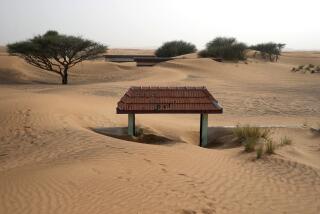Funds From Overseas Workers Transform Rural Egypt
- Share via
GAAFRA, Egypt — Amin Swabi returned to his village the other day for the first time in five years. Over his peasant’s caftan, he wore a new trench coat, and in his head he carried thoughts of money.
“The dollar’s very strong right now,” Swabi said, “so I have many good ideas. Maybe import-export. Maybe a store of some sort. I will look around and see what works. I know there’s money to be made.”
Swabi, 27, just back from five years of studying and working in New York City, paused to exchange greetings with friends who had gathered to welcome him in the schoolyard of this farming village, a 90-minute drive northeast of Cairo.
“Wow, everything is different,” he said. “My brothers got big. The village seems richer. Television sets, ovens, cars--people have things now. In the United States you have everything because there’s big money there, but this is a change, finding Gaafra richer.”
TV on Installments
Fifteen years ago, a car on the dusty main street here would have drawn stares. Skilled craftsmen then earned the equivalent of about 25 cents a day. Today in Gaafra (population 8,000), and in hundreds of villages like it, television sets are sold on the installment plan, electricity and running water are commonplace, children wear shoes bought in Cairo, a common laborer can make the equivalent of $12 a day, and the price of a truck is within the reach of many farmers.
The transformation of rural Egypt has been financed by the money sent home by more than 3 million Egyptians working abroad--$6 billion to $10 billion a year, more than the combined revenues from the Suez Canal, the cotton and tourism industries and exported oil. The government encourages workers to go abroad, not only for the money they send home but as a means of dealing with unemployment.
Unlike Swabi, most Egyptians who go abroad to work go to the oil-producing countries. There a teacher with a master’s degree can make $12,000 a year, equal to 20 years’ work at home. A laborer can make $5,000. When they come back to Egypt after three or four years, many have saved enough to buy a house and invest in a business.
“The change has been tremendous,” said Adel abu Latif, headmaster of Gaafra’s school. He bought a condominium in Cairo with the money he saved teaching in Libya from 1970 to 1975.
Broadcast Hours Reduced
“Everyone has a TV and a radio,” he went on. “In fact, farmers now spend more time watching television than they do farming. And they eat canned fruit, the same fruit they used to grow.”
Last year, electrical consumption in Egypt increased 16%, causing shortages in some industrial areas, and in an effort to reduce use the government has started closing the two state-run television stations an hour earlier. It is also taking steps to ensure that farmland is not eaten up by urban encroachment.
Sociologists are concerned about the rural transformation’s adversely affecting traditional family values. They point out that the new, monied peasant represents a challenge to the established order of the village hierarchy and that this has created a sense of disorientation in a class-conscious society.
Suddenly, an illiterate maid can make more than a schoolteacher; tenant farmers have become landlords; the sons of donkey-cart drivers have come home from universities with degrees in engineering and commerce. At some stage, sociologists say, this newly rich class will want a role in politics and a voice in the national debate.
‘Destructive Effect’
“I think this huge cash flow has had a destructive effect on society,” said Mohammed Heikal, an Egyptian writer and social commentator. “There is a whole new set of values now. Individualism has replaced nationalism. Intellectual life has suffered. Money has become the new power.”
The new era of what Heikal calls “cashism” was made possible by a combination of factors. The oil boom of the early 1970s created the demand for millions of workers in the oil-producing countries. President Anwar Sadat’s “open-door” policy, proclaimed in 1974, encouraged foreign investment and the growth of the private sector. His trip to Jerusalem in 1977 began a process of peace that enabled Egypt to shift its resources from the military to national development.
In Gaafra, headmaster Latif estimates that 150 villagers, including eight of his teachers, have worked or are working in the Persian Gulf states and Saudi Arabia. Some of the changes that have resulted are worrisome, he said, but added quickly: “Life is better now than before.”
More to Read
Sign up for Essential California
The most important California stories and recommendations in your inbox every morning.
You may occasionally receive promotional content from the Los Angeles Times.










